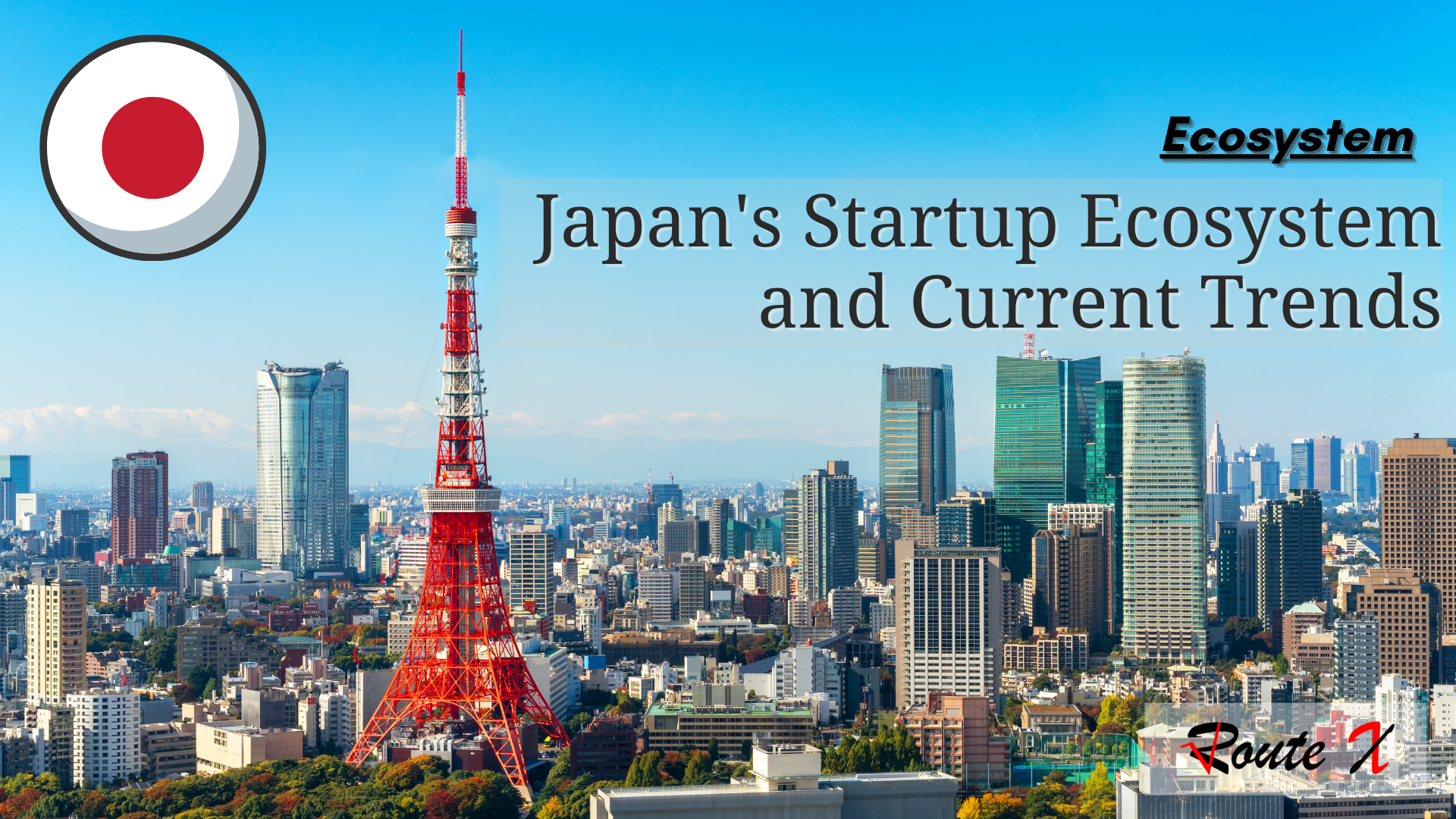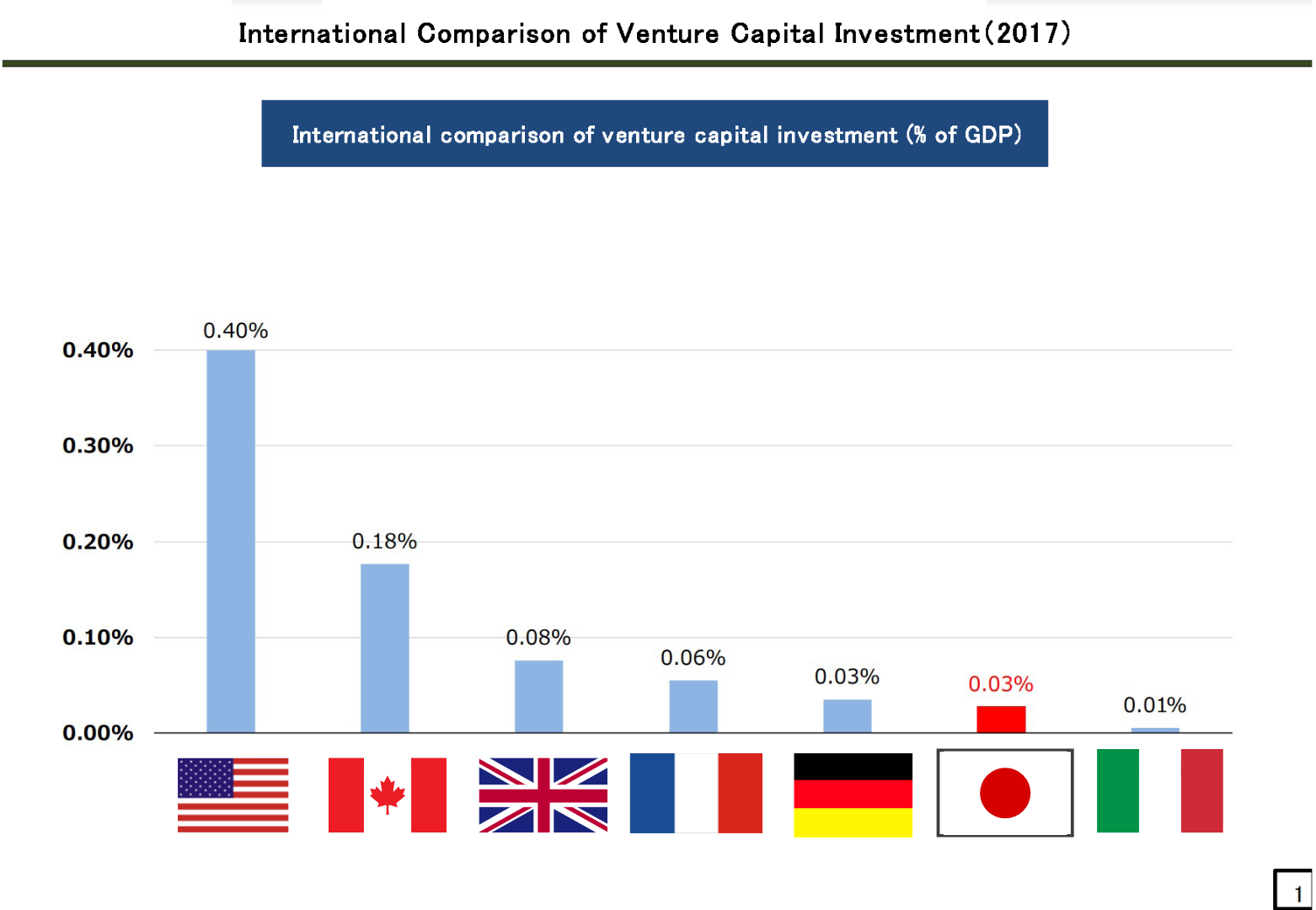#Ecosytem
#English Article
#japan
#Japan Stratup
#Japanese startup Ecosystem
#Startups
#tokyo
#スタートアップ
#スタートアップエコシステム
#日本
#東京

Japan’s nascent, evolving ecosystem
As Japan’s startup ecosystem continues to take shape, new startups are active all over the world. The United States has traditionally led the global startup community with Silicon Valley at the forefront, and with China rapidly asserting its presence, the United States and China now account for the majority of the world’s unicorn companies.
According to data from Japan’s Cabinet Office, Japan’s venture capital investment to GDP ratio was 0.03% in 2016, one of the lowest among the G7 countries with only Italy having a lower rate. Although the total amount of investment in Japanese startups is lower than in the US, China, and Europe in terms of economic strength, the amount of money raised by Japanese startups has increased rapidly in recent years. With more than 10,000 startups currently operating in the country, Japan is experiencing a “fourth startup boom” as the domestic startup market expands with the support of the national government.

The fourth startup boom
Japan experienced three startup booms in the past, with the first of these happening in the 1970s when many manufacturing technology companies were born as Japan’s first private venture capital appeared. The second boom occurred in the 1980s, coinciding with the shift from manufacturing to tertiary industries such as the service industry. The 1990s brought the third boom, when a large number of new companies were born as a result of global IT demand combined with active support from the government to counter the economic recession.
However, none of these previous booms resulted in the formation of a true startup ecosystem in Japan.
In contrast, the current 4th boom ongoing since 2014 brings with it the expected formation of a startup ecosystem, thanks to a more favorable environment for startups in comparison to previous booms.

Innovation districts in Japan
Not only in the United States but also in countries such as China and Israel, a startup ecosystem has developed in which startup companies are born and grow one after another. While the Silicon Valley ecosystem arose spontaneously, in New York, Montreal, and Tel Aviv, the ecosystem was created systematically. In the case of New York, one of the critical factors in the local ecosystem’s development was the local government’s initiative to promote startups that differed from existing industrial structures in order to recover from the 2008 financial crisis.
To develop a startup ecosystem in Japan similar to those overseas, it is essential to foster a culture of easy communication and good use of human networks, owing to the fact that startup innovators tend to prefer attractive cities and communities where innovators gather.

Amid this global trend, the Japanese government has launched a strategic initiative called Beyond Limits, Unlock Our Potential in order to establish and develop a Japanese-style startup center of world-class excellence. This initiative aims to create a hub for a startup ecosystem that will enable entrepreneurs to transcend the limitations of the past (Beyond Limits) and unlock Japan’s potential (Unlock Our Potential).
One of the features of this strategy is the creation of ecosystem hub cities, with the vision that a consortium of local governments, universities, and private organizations will support new startups locally.
With the aim of developing a startup ecosystem similar to Silicon Valley, the central government has designated the four metropolitan areas of Tokyo, Aichi, Osaka, and Fukuoka as startup hubs to attract foreign investment and human resources. As of July 2020, 181 organizations, including major corporations and the University of Tokyo, are participating in the consortium.
In addition, the government has selected four cities, Sapporo, Sendai, Hiroshima, and Kitakyushu to lead region-specific ecosystems. In the case of Sapporo for example, the Sapporo-Hokkaido Startup Ecosystem Promotion Council has been established to bring together government, universities, private organizations, and other local organizations to form an ecosystem that leverages the respective strengths of each organization in order to create and nurture globally active startups from Sapporo and all of Hokkaido.

With these initiatives, the Japanese government is supporting the formation of startup ecosystems all across Japan.
In 2021, Tokyo rose to ninth place in the global ranking of cities where startup companies are likely to grow, published by the US research firm Startup Genome.
This is the first time a Japanese city has reached the top 10, and Tokyo’s position is up significantly from the previous year’s position of 15th place. The city scored high in ease of fundraising and abundance of human resources, although many issues remain that must be addressed in order to achieve a higher ranking, such as the slow utilization of data for example.
Japan’s startup market is growing rapidly, but the growth has only just begun. Further development of the startup ecosystem is a major challenge for Japan going forward.
Japanese startup trends
According to a survey by Japan’s largest startup information platform INITIAL, Paidy was the top-fundraising Japanese startup in 2020. The company offers a service that allows users to complete payments with just a mobile phone number and email address, and to post-pay the total balance the following month. The reason for Paidy’s success likely lies in the growth of e-commerce due to the Covid-19 pandemic, which has brought an increase in consumer payments as well as business-to-business payments.

By sector, the top area for funding is AI, which was the largest area for investment in 2019 and 2020 according to the INITIAL report.
The current situation suggests that we need to use AI and digital technologies to fight the effects of the pandemic.
In summary, startups in digital fields are growing rapidly in Japan. For decades Japan has been known as a manufacturing powerhouse and large enterprises in Tokyo were the center of the Japanese economy, but the open and innovative spirit of startup ecosystems across Japan will boost the new era of Japan’s economy.


Author:Rie Azuma
While studying in Russia, I was amazed by the public transportation system that seemed more convenient than in Japan, and became interested in smart cities. I’m also interested in technology and global business trends from my many experiences abroad. I’m curious about international politics and economic security, and analyzes the global startup ecosystem from various perspectives.
At RouteX Inc, I’m mainly in charge of research.
(日本語)
投稿者:東 里恵
ロシア留学中に、日本より便利と思われる公共交通機関に驚き、スマートシティに興味を持つ。また多くの海外経験から、各国のテクノロジーや世界のビジネストレンドにも興味を持つ。国際政治や経済安全保障にも関心があり、世界のスタートアップエコシステムを様々な観点から分析。
RouteX Incでは主にリサーチを担当。
RouteX Inc. will continue to collaborate with startups around the world in order to eliminate “information asymmetry” in the startup ecosystem.
We will also regularly publish articles on Japan’s startup ecosystem.
Please feel free to contact us if you are interested in collaborating or partnering with RouteX Inc. if you are an overseas startup looking to enter the Japanese market.


